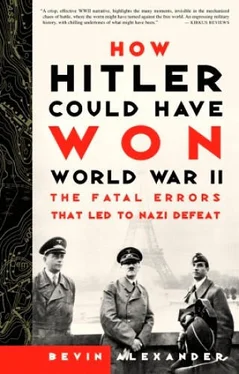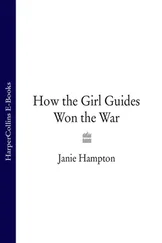On January 9, 1943, a Russian delegation called on 6th Army to give up. On Hitler’s orders Paulus rejected the demand. Manstein supported the Fuehrer’s decision. Although the army was perishing, it still had a strategic role to play—tying down the maximum number of Soviet troops to permit the rest of the German army to get away.
The Soviets were fully aware of 6th Army’s continued service and unleashed a violent attack on January 11, breaking through at several points. They ousted the Germans from most remaining shelters, especially in the westernmost part of the pocket. The Germans now huddled in the ruins closer to the Volga.
Weather and Soviet fighters reduced air deliveries to a trickle. Soviet attacks seized Pitomnik, the best airfield. Supplies totaled only 90 tons from January 17 to 23, 1943. Russian forays broke up the caldron into separate blocks. After January 28, the wounded and sick no longer were given bread. The Germans lost their last airfield at Gumrak. Efforts by Luftwaffe crews to throw out packages from the air helped little. Soviet regiments climbed out of their covers and overran one position after another. On February 2, the last resistance ceased.
The Luftwaffe had evacuated 25,000 wounded and specialists, but about 160,000 men died and 91,000 were captured. Most of the prisoners soon succumbed to exposure or typhus. Only 6,000 saw their homeland again, some after twelve years of captivity. Paulus, promoted by Hitler to field marshal on the assumption that he would shoot himself, did not, and surrendered to the Russians.
Manstein got little help from Hitler in saving the remainder of the German forces on the southern front. In a series of massive retreats, Germans abandoned Kursk and fell all the way beyond Kharkov, 430 miles west of Stalingrad.
But Manstein prevented a rout, overcame Hitler’s inability to see the danger facing the army, and held Rostov open long enough for the Germans to withdraw from the Caucasus. Even so, Hitler insisted on keeping the 17th Army in the Kuban region of the northern Caucasus opposite the Crimea, where it served no purpose. Manstein formed a new line along the Mius River, some forty miles west of Rostov, and stopped the Soviet advance.
Manstein was even able to get Hitler’s permission to authorize an envelopment of the overextended Russian forces at Kharkov, which Manstein recaptured on March 14, 1943. It was the last great success of German arms on the eastern front.
16 THE WESTERN ALLIES STRIKE

IN JULY 1942, WITH ROMMEL STOPPED JUST SIXTY MILES FROM ALEXANDRIA AND the Germans advancing toward Stalingrad and the Caucasus, there were two major issues dividing the Allies: what the Americans and British were going to do to help defeat Hitler and whether Stalin would seek a separate peace.
American and British leaders were well aware that they could not overcome Germany without the Soviet Union. However, Joseph Stalin, complaining bitterly that they were leaving virtually all the fighting to the Red Army, was putting out peace feelers in Stockholm.
Western leaders didn’t think these feelers would amount to much if they attacked the Germans directly and took pressure off the Soviet Union, as Stalin had been demanding for months. But the British and Americans were virtually immobilized by an acrimonious dispute about what they should do. The Americans, led by George C. Marshall, army chief of staff, wanted a direct advance by a five-division amphibious landing around Cherbourg in Normandy in 1942 (Operation Sledgehammer). But the British pressed for an indirect or peripheral strategy, a combination of massive air attacks on German cities and smaller, less-dangerous invasions in the Mediterranean.
President Franklin D. Roosevelt saw more clearly than anyone that the western Allies must show Stalin that Russia was not being left to face Hitler alone. He decided that the Americans had to fight the Germans somewhere in 1942. Since an invasion of France was out, given British opposition, FDR cut the Gordian knot and ruled that the American strike had to be in North Africa.
Roosevelt left it to Marshall to decide where Americans would go in Africa—as reinforcements to the British 8th Army building strength to challenge Rommel at El Alamein or landings in French North Africa (Morocco, Algeria, Tunisia), controlled by Vichy France. Marshall, knowing that 8th Army would remain under British General Sir Bernard Montgomery, chose French North Africa (code-named Gymnast), and was able to name his protégé, Lieutenant General Dwight D. Eisenhower, as commander.
Gymnast was an old British plan that called for a descent on Algeria if 8th Army won decisively in Libya and pushed for the Tunisian border. As Montgomery was now girding at El Alamein, the aim of Gymnast (its name changed to Torch because it sounded grander) was to seize Tunisia before the Germans got there and force Panzer Army Africa and the Italians to surrender.
Torch at once gained the advantage Roosevelt was hoping for: when Stalin heard about it, he stopped complaining about a second front. But the decision to turn to the Mediterranean aroused dark suspicions among American planners that Churchill was maneuvering the United States into the “soft underbelly” strategy. They feared this would lead to the invasion of Italy, and perhaps Greece, and fatally undermine the plan to collide with the Germans on the beaches of France.
President Roosevelt was less worried, because he hoped “an air war plus the Russians” could defeat Hitler, and a cross-Channel assault might not be necessary.
Western Allied military strength was not being concentrated in ground forces, as was the case for Russia and Germany. The United States and Britain put great emphasis on air and naval power, and Roosevelt set a limit of 90 army divisions for Europe and the Pacific, while the British mobilized 27. Many U.S. divisions had not even been formed, and only 70 ever got to Europe, yet Germany had 260 divisions actually in the field, and the Russians many more.
The Allies decided to invade French North Africa, but not when or where. Because of supply and troop transport problems, the American chiefs of staff set the date at November 8 and announced they planned to confine the landings to the west or Atlantic coast of Morocco, primarily around Casablanca. The British were shocked. The invasion, they said, should be made inside the Mediterranean on the Algerian coast, so troops could advance quickly to Tunisia.
The Americans chose Casablanca—1,100 miles from Tunis and Bizerte, the main Tunisian ports—because they feared the French would resist strongly in Algeria, while the Germans might rush through Spain, seize Gibraltar, block the Strait of Gibraltar, and prevent supplies from reaching the troops.
The British were dismayed at such extreme caution and argued that the American plan would allow the Germans to seize Tunisia, frustrating the entire purpose of the operation. Eisenhower came around to the British point of view, and proposed eliminating the Casablanca landings.
But Marshall would not take the chance of supplies being cut off at Gibraltar and FDR ruled the Americans had to land at Casablanca, to guarantee an Atlantic supply base, but could also land at Oran, 250 miles west of Algiers. He suggested that the British land a few days later at Algiers and points eastward. Roosevelt also wanted the British to keep a low profile, reasoning that the French were angry with them for attacking their ships after France surrendered in 1940 and for invading the French colony of Madagascar in May 1942. The 135,000 men in the French forces would probably resist the British, but perhaps not the Americans.
Читать дальше



![Джонатан Димблби - Barbarossa - How Hitler Lost the War [calibre]](/books/385421/dzhonatan-dimblbi-barbarossa-how-hitler-lost-the-w-thumb.webp)









